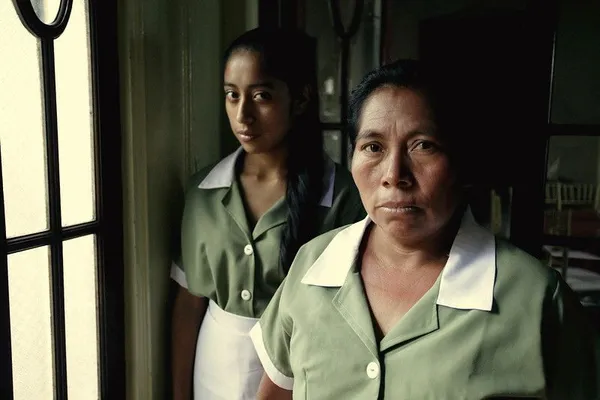Eye For Film >> Movies >> La Llorona (2019) Film Review
La Llorona
Reviewed by: Amber Wilkinson

A version of the weeping woman La Llorona myth seeps into the pores of Jayro Bustamante's haunted and haunting consideration of Guatemala's genocide. In the original legend - which also cropped up last year in Michael Chaves' The Curse Of La Llorona - the woman drowns her children and is doomed to spend eternity searching for them. Here, the wailing mother and her children represent the spirits of innocent lives lost and infiltrate proceedings in a similar fashion, although more genre-based and tautly written, to those in Mati Diop's Atlantics.
When we first see the ageing General Enrique Monteverde (Julio Diaz) roaming the house at night, gun clutched tightly in his hand because he thinks hears something crying, the sound could just be the wail of the wind, although the consequences might prove deadly. He certainly has plenty on his conscience to keep him awake at night, as he's standing trial for the genocide of the Mayan-Ixil - about 3000 a month of whom were killed between 1982 and 83, a fact that among many other horrific crimes is revealed to us as we watch the trial progress. Monteverde's wife Carmen (Margarita Kenéfic) and daughter Natalia (Sabrina De La Hoz) put his nocturnal wanderings down to Alzheimer's and stress. His wife seems pretty choosy about what she wants to remember, too, when it comes to consideration of her husband's time in the Army. Their home, meanwhile, is the pinnacle of upper middle-class colonial taste, right down to their indigenous staff, headed by maid Valeriana (Bustamente regular María Telón).
The class structures - that Bustamante also skewers in his second film Tremors, which premiered just six months before La Llorona - are so tight that Natalia's doubts about her dad are reined in by them. The home help have no such restrictions, however, and see the wailing and plumbing problems as a sign to get out. As protests build up outside the family's house, a woman from Valeriana's home village arrives to help. But it seems there may be more to the long-haired near-silent Alma (María Mercedes Coroy) than first appears.
Bustamente, in both of his films last year, prefers subtle suggestion to overt statements. Here, that decision adds to the unsettled and melancholic mood, which keeps us guessing as to what degree the supernatural is in play and to what degree of malevolence, with the film less about ideas of revenge than collective mourning.
Children, too, are key to both films, where they are seen as being much more able to recognise the truth of situations than their older relatives. They offer hope but also the fear that they too might grow to quickly forget their country's bloody past.
As the family tensions are pulled taut, our nerves are also set jangling by the sound design, including the chants of protesters and the nighttime noises of the house. The director and his cinematographer Nicolás Wong also show a painterly eye for composition and colour, whether its the dark palette that seems to almost engulf Monteverde's trial or night time scenes that suffuse the film with a watery blue. This film is crying and it wants us to listen.
Reviewed on: 10 Jan 2020

















